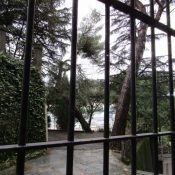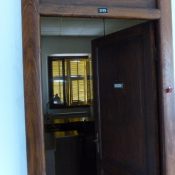I don’t know if you have ever had to repot a seedling…if you have, your gaze may have fallen on the roots, noticing how they had grown occupying all the possible space, taking the same shape as the vase, as if they were trying in every way and almost spasmodically to absorb as much as possible from that little piece of earth.
In fact, there comes a time when, if we want the plant to continue growing, we need to repot it.
Just as for plants, so it is that for us to grow – after a certain period – separation is necessary. We need to find a new vase, new earth, because the previous one – which was fundamental and essential for us to become what we are – is no longer able to give us nourishment and space. Of course, this can be a bit painful because it requires separation from something that was familiar to us up to that point, but it does not mean denying one’s roots: those we carry along with us and even a little of our native soil remains attached to us.
For me the Novitiate is precisely this new fertile earth that is giving me the sap, nourishment and space to make me grow. A simple list of the various activities and moments we share would be reductive and emptied of much of the meaning, but if I had to choose just one word to describe what we “do”, or better, “live” in the Novitiate, I would say growth … In fact, this period is essentially a time to get to know yourself more and more. It may seem strange, because in the frenzy of my daily routine I often took the knowledge of myself for granted, thinking that there was no one capable of knowing me better than myself. Instead, I’m discovering – and every day is a discovery – how little I actually knew. Thanks to prayer, to the dynamics and relationships that are created in community, and to the accompaniment of Fr. Master I am acquiring ever more an awareness of my abilities, but also of my limits and fragilities, of the conditionings and the false ideas of myself that I have built over time. Therefore I am living this period simply as a “grace”, a gift, in which I have the fortune and the privilege of receiving so much for free.
Finally, there is one last fundamental element which needs to be specified to explain the meaning of this time. In fact, to continue the botanical example, what do you do with a seedling that grows, but then doesn’t bear fruit?
Growth is not an end in itself, it is not to be able to boast or to consider oneself better, but to be always more free to love!
Until recently this expression would have seemed – if not really meaningless – certainly not very significant. I would have said to myself: “How can one not be free to love?”
Now, however, I’m realizing how much my idea of love was romantic and of freedom naïve. I am realizing that being free is not so much an external question, but rather refers to the inner dynamics that guide our thoughts and our actions. That to free oneself from fears, from conditioning, from secondary ends, to be able to really love the other, to want his growth and his good is really difficult, it costs effort and requires sacrifices.
For this reason having a good point of departure and someone who takes care of the personal growth of us novices is really a great help!










Comments